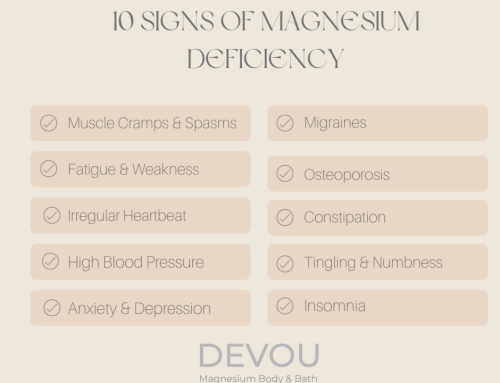Many people have trouble sleeping, and breaking the cycle of insomnia can be hard.
You can try changing your sleep routine and curbing your caffeine intake, but sometimes these lifestyle interventions can be ineffective.
Supplements are another popular option. Over the years, Magnesium has gained attention as a potential sleep aid.
Research shows that magnesium has wide-ranging effects in the body and has been shown to influence some of the processes that promote sleep.
Magnesium Helps Your Body and Brain Relax for a Good Night Sleep!
In order to fall asleep and stay asleep, your body and brain need to relax.
On a chemical level, magnesium aids this process by activating the parasympathetic nervous system, the system responsible for getting you calm and relaxed.
First, magnesium regulates neurotransmitters, which send signals throughout the nervous system and brain.
It also regulates the hormone melatonin, which guides sleep-wake cycles in your body.
Second, this mineral binds to gamma-aminobutyric acid (GABA) receptors. GABA is the neurotransmitter responsible for quieting down nerve activity. It is the same neurotransmitter used by many sleep drugs.
By helping to quiet the nervous system, magnesium may help prepare your body and mind for sleep.
Not Having Magnesium Interferes With Sleep
Not having enough magnesium in your system can cause troubled sleep and even insomnia.
Certain people have a higher risk of magnesium deficiency, including:
- Issues with your digestive tract can cause your body to not absorb vitamins and minerals properly, resulting in deficiencies.
- People with diabetes or Insulin resistance are linked with excess magnesium loss.
- People who consume alcohol heavily are often deficient in magnesium.
- Many older adults have less magnesium in their diets than younger adults and may also be less efficient at absorbing it.
If you’re not getting enough magnesium, then you may experience sleep problems.
Magnesium Improves Sleep Quality
Not only can magnesium help you get to sleep, but it plays a part in helping you achieve deep and restful sleep as well.
Magnesium helps improve sleep by improving levels of renin and melatonin that help regulate sleep. Magnesium deficiency results in sleep patterns that are light and restless. Increasing magnesium helps to improve quality of sleep due to its influence on the nervous system. It blocks more excitable molecules from binding to neurons, resulting in a calmer nervous system.
How to Use Magnesium to Help With Sleep
Recommended dietary intake is 320 mg of magnesium for adult women and 400–420 mg for adult men. (1) You can get magnesium through drinking water and eating foods such as green vegetables, nuts, cereals, meat, fish and fruit.
Since it’s clear that magnesium deficiency can impact sleep, a good first step is to make sure you’re getting adequate amounts from whole foods.
Unfortunately most people DO NOT get enough magnesium via food and supplementation is necessary.
The Simple Solution – Transdermal magnesium is key!
Magnesium, but first there are a few things you should know.
The upper limit for supplemental magnesium is 350 mg per day that’s when you take it internally, however keep in mind that taking it in supplement form may cause side effects, including nausea, cramps or diarrhoea.
Transdermal magnesium, magnesium chloride applied to the skin via a cream or spray bypasses the gut and the negative side effects and goes directly to where we need it!
Hence why when applied to the skin, within 15 minutes, magnesium is working for you! Helping to calm your nervous system to improve your sleep by activating mechanisms that quiet your mind and calm you.
Try our most popular product our Essential Magnesium Night Cream or Essential Magnesium Night Spray for a calm restful deep night sleep!
You could also soak in a nice warm bath with our gorgeously blended Night Bath Soak a unique blend of Magnesium Chloride flakes, Lavender oil and Lavender and Chamomile flowers. It is so relaxing and and is certainly how magnesium helps you sleep. You will be nodding off before you know it.
Author – Jenny Charlesworth – Clinical Nutritionist



Leave A Comment